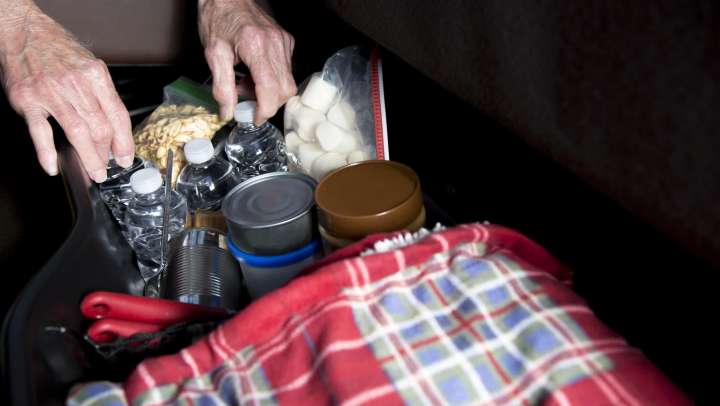Unpredictable and extreme weather can cause anxiety for senior loved ones and their caregivers, especially when hurricane season is in full swing. If your loved one is living alone or in need of support during the summer, rely on our storm season readiness tips to alleviate stress and help your family prepare.
Storm Season Readiness Tips for Supporting Senior Loved Ones
Summer brings plenty of opportunities for fun in the sun, but along with those sunny days and warm nights comes a five-month stretch of stormy weather known as the Atlantic Hurricane Season. For residents living in areas prone to hurricane impact, it's critical to have a plan in place to protect your home and personal safety.
If you’re caring for an older loved one or a loved one living with dementia, it’s essential to take precautions and prepare before scheduling summer plans and trips. In this article, we’ll share common emergency-preparedness tips that families can easily implement when extreme weather is on the horizon.
Start by Considering a Senior Living Stay
Preparing for any significant storm can be a stressful, time-consuming, and costly endeavor, especially for seniors living alone. If your senior loved one is “managing” life at home but dealing with complex healthcare needs, mobility challenges, or memory loss, managing an evacuation or preparing for a bad storm can cause distress. It can pose a serious threat to their health and safety, resulting in physical injury, confusion, and even cognitive decline.
Avoid the stress of storm preparedness altogether by considering the option of a senior living stay. Senior living communities offer numerous safety benefits to support senior loved ones and their caregivers, providing critical assistance, resources, and coordination in the event of a disaster. This option not only helps to prepare older loved ones before and during the storm, but it can also assist with the storm response after the event has passed. Here’s a look at a few of the many benefits available to senior living residents during a storm:
- 24/7 staffing and monitoring to ensure resident needs are met
- Access to community supplies and resources
- Collaborative emergency preparedness measures are initiated by community staff, which means responsibility doesn’t fall solely on the senior and/or their caregiver
- Timely, direct, and consistent communication of vital information with residents and families throughout the storm response
- Access to supplemental power for select functions, such as refrigeration and medical needs
- Emergency lighting and fire prevention measures
- Resident safety checks throughout the day
- Secured building and grounds
- An approved evacuation plan that provides oversight, staffing, resources, and safe transportation to alternative sites of care if residents’ safety is compromised or there is an extreme threat to the community
- Management of the storm recovery response (negotiating with insurance companies, securing bids for repairs, procuring contractors, restoring power, replenishing supplies, etc.)
Another benefit of living in a community is the prioritized support and assistance residents receive during an emergency response. Power may be restored and resources distributed more quickly in communities where older adults reside, compared to other neighborhoods. Seniors living alone and in rural areas can experience service disruptions for days or even weeks, making it even more challenging to manage daily life safely and independently.
A short-term stay option at a senior living community during the summer season can provide an ideal opportunity to try out the lifestyle and take advantage of its benefits. This option can also offer respite and peace of mind for family caregivers who are coordinating support for a loved one with dementia. Caring for a family member with Alzheimer’s or dementia can become increasingly stressful when storm preparations are needed, and a community setting can help provide enhanced safety and security and consistency of routine.
Riding Out a Storm at Home: How to Prepare
If a loved one will be riding out a storm at home, create a plan in advance to ensure their safety. Below, we share guidance for identifying a loved one’s priority needs and recommendations for actions that should be taken. Ensure that proper emergency preparations are in place by gathering necessary supplies, enlisting support in advance, and communicating this plan to your loved ones, and any family members or friends.
Secure Your Home
Think ahead about protecting your home - both indoors and out – before a severe storm strikes, especially when living alone. Plan to share contact and location information with neighbors or close friends in case you need to evacuate and require updates from your hometown or neighborhood. Below are a few steps to help secure your home:
- Repair roof/window leaks or faulty features that can cause greater damage
- Close and lock all windows and doors, and cover with shutters or plywood if preparing for high winds
- Secure outdoor furniture, potted plants, trash cans, flags, and other fixtures
- Shut off the main water valve and main electrical fuse or breaker box
- Move fragile or valuable objects away from windows and wrap them in plastic wrap or garbage bags
- Fill sinks and bathtubs with water to use for bathing, washing clothes, or flushing the toilet
- Make sure your vehicle has a full tank of gas
- Have extra propane available for your grill and be sure it is situated in a safe area (Never use any propane grill indoors!)
- Have plastic sheeting, tarps, duct tape, or sandbags available
Gather Supplies
A practical summer storm or emergency preparedness kit should consist of the following: essential supplies, health and safety necessities, and critical documents. The lists below provide a good starting point for collecting storm supplies for yourself or a senior loved one.
When gathering supplies, prioritize the daily necessities you will need most frequently, should you lose power or need to prepare for evacuation and seek shelter elsewhere. Set aside enough supplies to last at least three days for each person. Any items currently stored at home should be inspected for expiration dates and safe use and assembled in a secure, weatherproof tote. This storage kit should keep supplies dry and easy to transport when needed.
- Water (one gallon per person, per day)
- Non-perishable food (canned food, can opener, dry goods, protein drinks)
- Matches or lighters in a waterproof container
- Battery-powered flashlight and lantern
- Battery-powered radio
- Extra batteries, phone charger and cable, and solar chargers
- Blankets or sleeping bags
- Extra clothing & rain gear/poncho
- Garbage bags, zip-top bags (for keeping things dry)
- Soap, wipes, and hand sanitizer
- Toilet paper and paper towels
- Mess kits for eating, disposable plates/utensils
- Reusable water bottles
- Whistle for alerting rescuers</li>
- Waterproof smartphone bag
- Pet supplies
For a more extensive list or additional information to consider when creating a storm supplies kit, visit >www.ready.gov.
Address Health & Safety Needs
Ensure a sufficient supply of health and safety necessities, including medical and personal care items and equipment needed to maintain an individual’s independence. These can include:
- Mobility aids or assistive devices (walkers, wheelchairs, oxygen tanks, etc.)
- Eyeglasses/contact lenses and vision care items
- Hearing aids (and batteries)
- Personal hygiene and continence care items
- Towel and facecloth
- Face masks to filter dust and bacteria
- First-aid kit
-
All medications and supplies, including those only needed for emergencies
- Daily prescriptions
- Over-the-counter medications
- An updated personal medication record
- An insulated bag with ice packs for short-term temperature control when refrigeration of medication is not available
Whenever possible, fill all prescriptions in advance to avoid running out of any necessary medication. If an evacuation is required, you don’t want the added stress of knowing medication is not readily available.
Collect & Protect Critical Documents
Critical documents are vital to prepare in advance of any storm and can be collected with minimal or no additional cost to your monthly budget. Think of these documents as the “paperwork” you file in a safe place, such as:
- Personal identification (driver’s license, birth certificate, passport, etc.)
- Medication and immunization records
- Social security cards
- Family records (marriage license, etc.)
- Health insurance cards
- Wills, advanced directives, and power of attorney documentation
Once your documents have been retrieved from safekeeping, secure the original copies in a weatherproof tote (zip-top freezer storage bags also work) and ensure that additional copies are available for backup purposes. Cash, checkbooks, family contact info, and details for health, home, and other insurance policies should be easily accessible.
For practical assistance with this task, the “Vital Document Checklist” offered by AARP’s Operation Hurricane Prepare is a printable tool designed to help seniors and their loved ones complete this collection process.
Define Your Evacuation Plan.
The thought of having to evacuate can be scary for anyone, especially for an aging loved one living alone. However, defining your evacuation plan in advance can help alleviate the stress that comes with receiving a last-minute evacuation order. Consider how and where you would evacuate, as well as what items you would take with you.
As mentioned, keep your essential supplies, health and safety necessities, and critical documents securely stored in a dry, waterproof tote that can easily travel with you.
Have cash, car keys, phone numbers of family and friends, and shelter information easily accessible in your travel kit. Also consider including maps for navigating the roads, an essential resource if online map functions are unavailable due to lost cell service. Google Maps’ offline feature can be downloaded in advance or try an app, such as Navmii which can provide travel routes even when traffic and road closure information is not available. Stay well-informed about evacuation routes and local updates during any weather event.
We’re here to help!
Planning and preparing for unpredictable weather can create a “storm” of emotions for seniors and their families. We’ll admit that, like most of you, we’re not particularly fond of extreme weather. However, we've weathered a storm or two and successfully supported hundreds of older adults and their families during seasonal storms and other challenges.
Before preparing yourself or a loved one for an emergency,connect with a Stoney Brook senior living experttoday. Discover assisted living and memory care options at Stoney Brook and the peace of mind that comes with senior living for residents and their families. Rely on our team to help! See what we’re doing to ensure our residents’ safety by visiting any of our Central Texas communities or checking out our Stoney Brook blog for more valuable resources.

